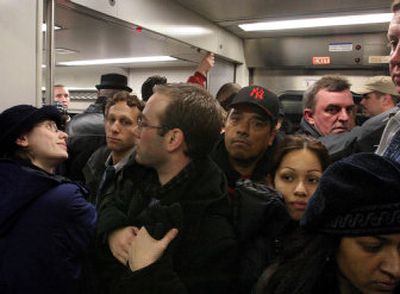N.Y. judge threatens to jail transit leader

NEW YORK – With Day 3 of a massive transit strike looming, tempers were rising in New York and the threats were getting personal.
A judge ordered union leaders to appear in his courtroom this morning to face criminal contempt charges for ordering the walkout in violation of state law.
New York’s attorney general suggested fining the union’s leaders, on top of the union’s $1 million-a-day fines, but State Supreme Court Justice Theodore Jones said it was a “distinct possibility” that he would jail union local President Roger Toussaint and his deputies instead for defying an order to end the strike.
In perhaps an even tougher measure, lawyers for the city began a separate legal proceeding Wednesday that could eventually lead to rank-and-file union members being hauled into court to face civil contempt charges and personal fines.
Michael A. Cardozo, New York City’s corporation counsel, asked the judge to issue a second order directing union members to return to work. If they ignore it, Cardozo said, the city could ask for heavy fines per worker – a punishment that goes beyond the docked-pay penalty workers already are facing for striking in violation of state law.
The fines, which would be at the discretion of the judge, could range from a few hundred dollars to a few thousand and would come out of the workers’ own pockets rather than union coffers.
As the dispute played out in court and in state-supervised mediation talks, millions of New Yorkers trudged to work and back in another bone-chilling commute without subways and buses. Some rode bicycles or in-line skates, while others walked for miles across bridges and through town.
“They’re too spoiled,” Isaac Flores said of the transit workers as he joined a complicated, four-person car pool to get to his job at a midtown law firm. “They want to retire at age 55. They’re making more money than a cop.”
According to Toussaint, the sticking point in the contract negotiations is a proposed change in pensions. The MTA’s last contract proposed maintaining a retirement age of 55 but increasing what new hires contribute to the pension plan. New employees would pay 6 percent of their wages during their first 10 years, rather than the current 2 percent.
“Were it not for the pension piece, we would not be out on strike,” Toussaint said in an interview with New York-based all-news channel NY1. “All it needs to do is take its pension proposal off the table.”